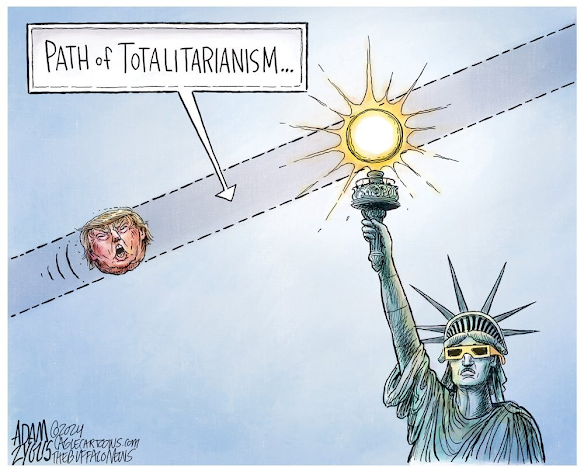 "Someone must have been telling lies about Joseph K., for without having done anything wrong he was arrested one fine morning."
"Someone must have been telling lies about Joseph K., for without having done anything wrong he was arrested one fine morning."
- The opening sentence of Franz Kafka's
The Trial
Having read
The Trial many years ago, I remember being initially struck by the patent absurdity of the novel's premise, that a man could be under arrest, allowed to move about with certain restrictions, and yet never learn the nature of the charges against him. The story does not end well for Josepsh K.
After reading it, of course, I realized that it was a metaphor for the totalitarian state, a state in which the innocent are swept up by the state after a murky process by which they are identified as enemies of the country.
Without wishing to be melodramatic, we are clearly moving closer to that state.
After the events of last week, tragedies that at this point appear to have been perpetrated by mentally disturbed individuals and not organized terrorism, the Harper regime seems to be edging closer towards measures that would allow for a much wider definition of 'preventative arrests,' already toughened up
last year, as well as a shielding of the identities of those who accuse others of being terrorists, neither of which would likely have prevented the deaths of two Canadian soldiers. Limits to freedom of speech, as noted
yesterday, are also being considered.
Today, The Globe and Mail
reports:
Measures now under consideration include changing the so-called threshold for preventative arrests and more closely tracking and monitoring people who may pose a threat, such as requiring them to check in with an officer regularly even without any charges against them. Being looked at, too, is potential legislation that would make it a crime to support terrorists’ acts online, says a senior government source.
Perhaps most ominously, a measure that brings us closer to the nightmare world of Joseph K., is the fact that
legislation giving the Canadian Security Intelligence Service (CSIS) the ability to better hide the identities of its informants (italics mine)...is to be tabled in the House of Commons as early as Monday or Tuesday, according to a senior government source.
Warns security expert Wesley Wark:
“Let’s be sure we know everything that was done and everything that was missed before we come up with fixes.”
Mr. Wark said that he “would be very cautious about deciding that the real fix is in extending legal powers or the real fix is in let’s go and use those preventive arrest measures … I would hesitate to advocate for that until we know what really went wrong.”
Secret trials, anonymous accusers, mass surveillance: strange ways indeed to protect our sacred democracy.
I'll leave the final word to
Star letter-writer Brigitte Nowak of Toronto:
The authorities have not yet stated whether the attack in Ottawa was made by one of the 90 or so “radicalized” persons under surveillance by authorities, but already, there are calls for “increased security.”
Average Canadians are already being videotaped wherever they go, subjected to demeaning scrutiny before accessing public buildings, airplanes, etc. Any more security, reduced freedom, additional surveillance, and the “jihadists,” bent on changing our way of life, will have won.


